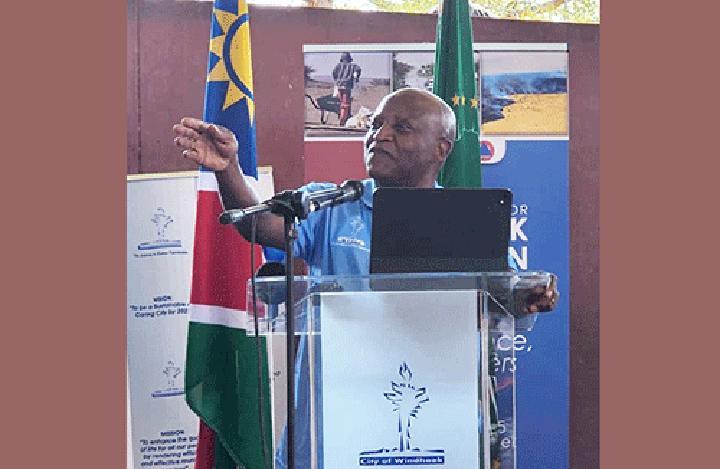Africa-Press – Namibia.
Prime Minister Dr. Elijah Ngurare has raised concern on the recurring loss of lives and property due to poor preparedness and a lack of infrastructure.
Ngurare referred to the recent veld fires in Etosha National Park, and the recuring burning down of shacks in informal settlements, noting that such losses can be prevented if proper planning is done.
He was speaking during the commemoration of the International Day for Disaster Risk Reduction in Windhoek. Ngurare stressed that time for rhetorical promises was over, as action is needed to prevent further loss of lives and property.
“We have fire brigades, but they cannot reach where there are no roads. We have water shortages where boreholes could easily save lives,” he said.
He called for leaders to approach disaster management through the lens of humanity, rather than politics.
“The child growing up in a shack is not less human than any other. Dignity must be seen, must be felt, and everyone must have it,” he said, urging inclusivity in resilience-building efforts.
The prime minister announced plans for emergency borehole drilling in and around Etosha National Park and reaffirmed government’s commitment to operationalising the National Emergency Operations Centre.
This facility will serve as a coordinated hub for early warning and disaster response.
The Prime Minister further applauded the World Food Programme (WFP) and other partners for their continued collaboration, noting successful resilience initiatives in Otjimbingwe Constituency and the rollout of the National Youth Development Fund worth N$500 million.
Namibia’s Prime Minister, Elijah Ngurare, has called for a decisive shift from theory to action in disaster risk management, urging leaders at all levels to translate policies into tangible solutions that safeguard lives and livelihoods. “Every word we say must not go with the wind. It must be implemented,” he declared, drawing applause from government officials, development partners, and regional leaders. No more waiting for miracles”, he said.
The Prime Minister underscored that disaster risk reduction must be rooted in practicality and compassion. He challenged local and regional authorities to take immediate steps, such as ensuring every household has a fire extinguisher and every village a functioning borehole.
“We cannot wait for Jesus to come and help us when we can help ourselves,” Ngurare said, warning that inaction costs lives.
“Behind every statistic in a disaster report is a human face, a mother, a father, a child who should not have died.”
Echoing the Prime Minister’s call for action, Benedict Libanda, Chief Executive Officer of the Environmental Investment Fund (EIF), said disaster management must shift from reactive to preventive approaches. “Disaster risk management is not the responsibility of one sector; it cuts across all sectors. We must invest in prevention rather than recovery,” Libanda stated.
He revealed that EIF has mobilised over N$6 billion towards climate resilience and water security, including the rehabilitation of more than 200 boreholes benefiting over 160 000 Namibians. Libanda also announced the Fund’s plans to unlock N$1.4 billion by 2026 to strengthen local adaptation and climate resilience programmes in regions such as Kunene, Khomas, and Hardap.
Ndeshihafela Larandja, mayor of the City of Windhoek, reaffirmed the municipality’s commitment to proactive risk reduction. She highlighted Windhoek’s participation in the Making Cities Resilient 2030 (MCR2030) campaign and the launch of the City’s Disaster Risk Reduction Strategy 2025–2030, which integrates climate change, water, and sustainable development plans.
“Cutting disaster risk reduction funding only makes future disasters more expensive,” the mayor warned. “Resilience pays dividends, but only when we actively invest in it, she said.”
The event, attended by the Governor of the Khomas Region, Sam Shafiishuna Nuyoma, UN agencies, NGOs, and various regional councils, carried a unifying message: That disaster preparedness is not an option, but a shared national responsibility.
“Our national approaches must be informed by unity of purpose. We must act now, because when a life is lost, it is a permanent loss that cannot be undone.” Ngurare said.
For More News And Analysis About Namibia Follow Africa-Press






